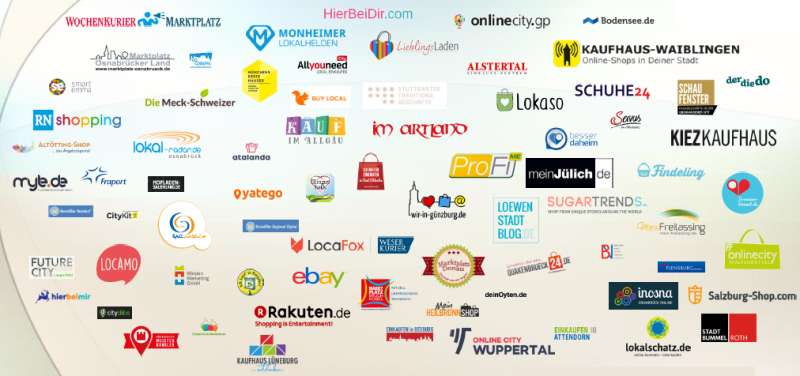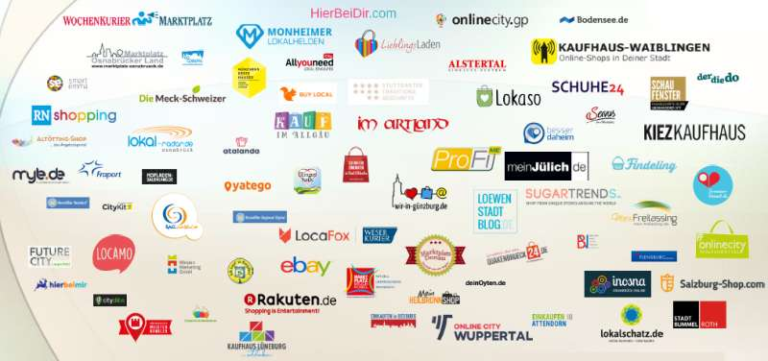Amazon vs. eBay — which marketplace to choose?
- 23 February 2023
Running sales activities in the modern e-commerce market requires entrepreneurs to use an omnichannel strategy. It consists in being present in several channels at the same time. In addition to their own online stores, sellers use, for example, marketplaces — such as Amazon or eBay. Which of these platforms is more powerful and useful? Let’s have a look.
Amazon vs. eBay — how do these platforms work?
Amazon and eBay are both e-commerce platforms that allow people to buy and sell goods online.
Amazon is one of the largest online retailers in the world, offering a wide variety of products, from electronics and books to groceries and clothing. It was founded in 1994 by Jeff Bezos and has grown to become one of the most valuable companies in the world. Amazon offers a range of services, including Amazon Prime, which provides fast shipping, streaming of movies and TV shows, and access to exclusive deals.
eBay is another popular e-commerce platform that was founded in 1995. Unlike Amazon, eBay does not sell its own products, but instead provides a platform for individuals and businesses to buy and sell goods. eBay allows users to bid on items in auctions or buy items at a fixed price. It also offers a range of tools and services for sellers, including the ability to set up an online store and manage listings. eBay is known for its wide variety of products, including vintage and rare items that may be difficult to find elsewhere.
Both Amazon and eBay have become popular options for consumers who prefer to shop online, and each platform has its own unique features and benefits.
Amazon vs. eBay — which marketplace is bigger and more popular?
As of 2023, Amazon is a much bigger company than eBay. It is currently one of the most valuable brands in the world, with a market capitalization of around USD 1 trillion. In contrast, eBay has a market capitalization of around USD 27 billion. Amazon also has a much larger revenue stream than eBay. In 2022, Amazon reported revenue of almost USD 514 billion, while for eBay, it was only around USD 10 billion.
While both companies operate in the e-commerce space, Amazon has expanded its services beyond this market to include cloud computing, digital streaming, and other tech-related services. This has allowed Bezos’s platform to become a major player in the technology industry, while eBay remains primarily focused on its e-commerce activity.
While eBay is well-known in the world, it is not as popular as Amazon. According to data from Statista, eBay had around 138 million active users worldwide as of Q2 2022, while Amazon had over 200 million active customers in the United States alone. Additionally, eBay’s market share is significantly smaller than Amazon’s, with eBay accounting for around 4% of global e-commerce sales in 2020, compared to Amazon’s 38%.
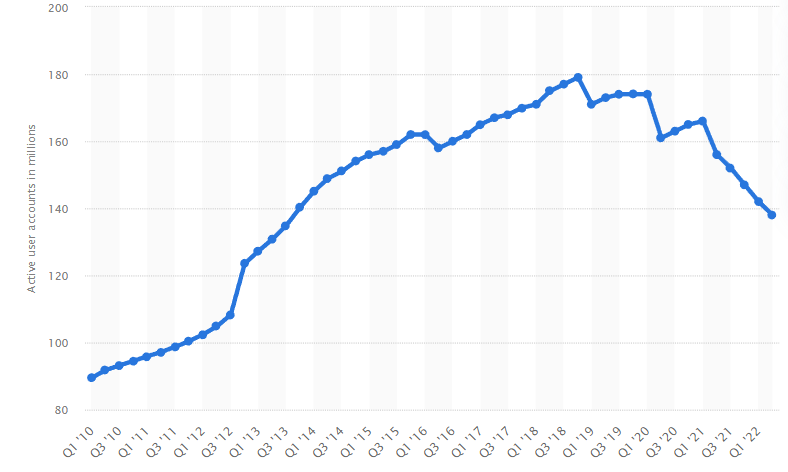
The number of eBay users. Source: https://www.statista.com/statistics/242235/number-of-ebays-total-active-users/
It is, however, worth noting that eBay is more popular than Amazon in some countries. For example, it has a particularly strong presence in Europe, where it is the largest online marketplace in several countries, including Germany, Austria, and Switzerland. In these places, eBay is more popular than Amazon in terms of market share and the number of active users.
In other parts of the world, such as Asia, Amazon is generally more popular than eBay. It has made significant investments in countries like India and Japan and has been rapidly expanding its presence in the region. As a result, Amazon has become a popular e-commerce destination for many consumers in Asia.
Amazon vs. eBay in terms of buyer protection
One of the most important aspects that determine the popularity of both platforms is the protection of buyers. The more confident consumers feel, the more money they can leave in their chosen channel.
On Amazon, the A-to-Z Guarantee provides protection for buyers who purchase items from third-party sellers on the platform. If a user does not receive an item or receives an item that is significantly different from the seller’s description, they have up to 30 days to request a refund.
On eBay, the eBay Money Back Guarantee also provides protection for buyers who purchase items from sellers on the platform. If a buyer does not receive an item or receives an item that is not as described, they can file a claim to be reimbursed for the purchase price of the item plus original shipping costs. eBay may also cover the cost of return shipping in some cases.
Both Amazon and eBay also have policies in place to protect buyers from fraudulent sellers or sellers who violate their policies. For example, both platforms may suspend or ban users who receive a high number of complaints from buyers or who violate their policies regarding items that can be sold on their platforms.
Amazon vs. eBay in terms of assortment
The selection of products available on both platforms can vary depending on location and other factors, and each marketplace may be better suited for different types of products or purchases. For example, eBay may be a better option for finding unique or one-of-a-kind items, while Amazon may be a better solution for purchasing everyday household items or products that require fast shipping and delivery.
Amazon is known for selling its own products as well as other well-known brands. It is unmatched in certain categories, such as multimedia or electronics. eBay, on the other hand, cooperates with a much larger number of individual sellers, which has a positive effect on the diversity of the offered assortment. This is especially important in the case of some rare items.
Amazon vs. eBay in terms of prices
Areas such as the range of assortment, buyer protection program or fast and convenient deliveries are very important for most consumers. However, the deciding factor in the finalization of the transaction is most often the price. Which platform sells products cheaper?
In general, prices on Amazon may be more consistent and competitive due to the platform’s size and scale, with many products being sold directly by Amazon or through third-party sellers who compete with each other to offer the lowest prices. This marketplace also has a range of programs, such as Amazon Prime, that offer discounts and free shipping for certain products.
eBay, on the other hand, may offer lower prices for certain products, especially if buyers are willing to bid on auction-style listings or purchase from smaller sellers who offer lower prices than larger retailers. eBay also has a Price Match Guarantee program for certain items, which promises to match the price of a competitor’s product if it is lower.
How to be a competitive seller on Amazon or eBay
Huge bases of potential customers, access to advanced marketing functions, and ease of sales service make Amazon and eBay very competitive channels. If you want to offer your products on one platform or the other, you need to be prepared to participate in price wars or avoid them. In this case, advanced price monitoring and repricing software will prove indispensable.
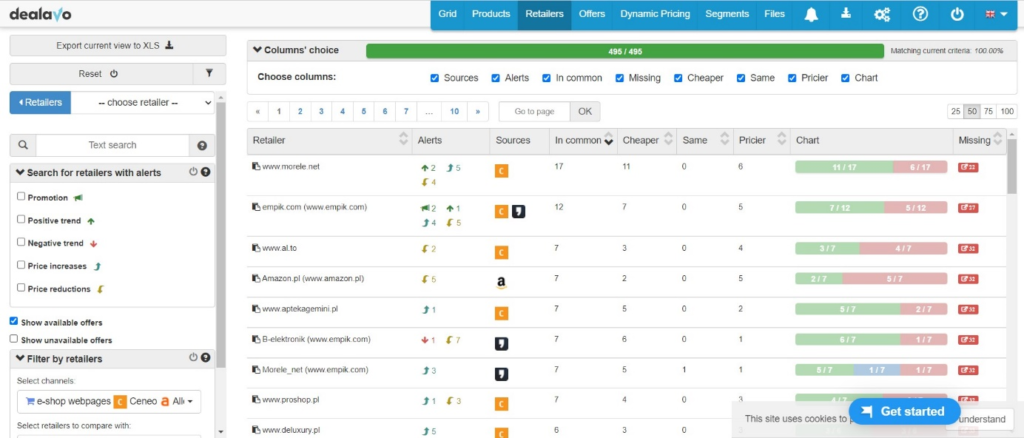
Such tools can help sellers on Amazon and eBay to track their competitors’ prices and adjust their own offers to remain competitive. These tools typically use automated algorithms and real-time data to monitor market trends, competitor pricing, and other factors that may affect the seller’s pricing strategy.
Among many price monitoring and repricing programs, Dealavo is worth paying attention to.
Dealavo – price monitoring tool for Amazon & eBay
Dealavo provides real-time data and insights on pricing trends and competitor behavior, allowing sellers to make data-driven decisions about their pricing and product strategies. Some of the key features of Dealavo include:
- Price tracking and monitoring — Dealavo tracks and monitors pricing data from a wide range of sources, including Amazon and eBay, to provide real-time insights on market trends and competitor pricing strategies.
- Competitor analysis — Dealavo analyzes pricing data from competitors, allowing sellers to adjust their own pricing strategies accordingly.
- Product tracking — Dealavo allows sellers to track the pricing and availability of specific products and alerts them about changes in market trends or competitor activity.
- Price optimization — Dealavo provides automated tools to help sellers optimize their pricing strategies, including dynamic pricing and price intelligence features.
- Dashboard and reporting — Dealavo provides a user-friendly dashboard and reporting features, allowing sellers to easily visualize and analyze pricing data and market trends.
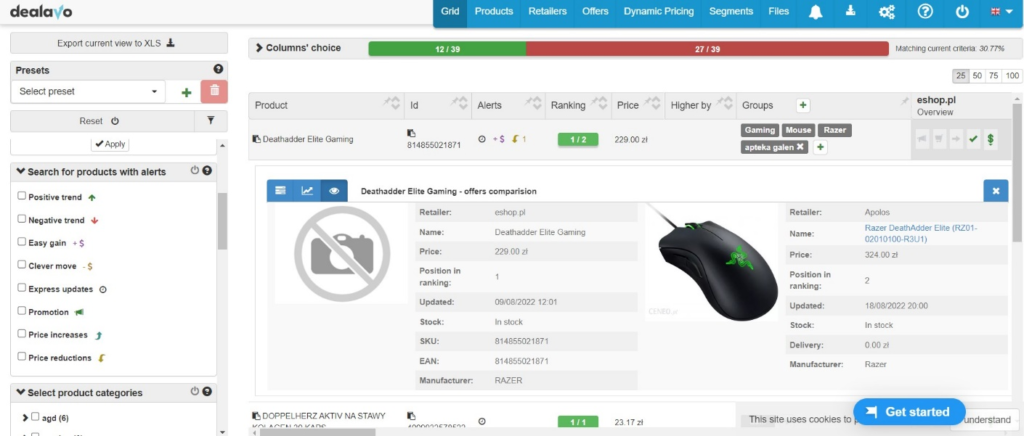
Thanks to Dealavo, you will quickly and easily build an advantage over market rivals, even in such competitive channels as Amazon and eBay.
Amazon vs. eBay — which platform should you pick?
When choosing between Amazon and eBay, you must first of all answer questions about the specifics and habits of your target group, as well as about your own business goals. Both channels can provide you with great opportunities in terms of sales and marketing, so it is really up to you which one you choose.
